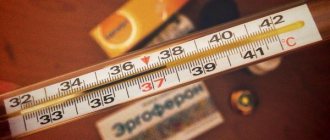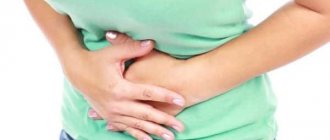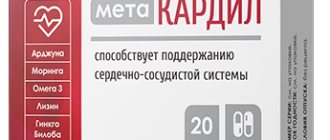Many women are concerned about low blood pressure during menstruation and its changes during this difficult period for the body. However, the pressure fluctuates due to purely physiological reasons, in particular due to the fact that hormonal levels change throughout the cycle. Depending on your general health and cardiovascular system, your blood pressure may not only fall, but also rise. At the same time, the changes are often not very noticeable, and therefore there is no reason for panic. But if changes in well-being are so serious that they affect the quality of life, you should seek medical help.
The relationship between the cardiovascular and reproductive systems in women
Hormones responsible for the proper development of a woman’s menstrual cycle are always present in her body. They have a significant impact on reproductive processes and also help in the regular retreat of the uterine endometrium. The ratio of these sex hormones in a woman’s body changes throughout the entire cycle: before, during and even after menstruation.
Sex hormones depend on the influence of the brain and adrenal hormones, and vice versa. This is due to the fact that adrenaline, aldosterone and glucocorticoids produced by the endocrine system affect the tone of blood vessels and are actively involved in regulating blood pressure. For this reason, many women notice a drop or increase in blood pressure not only during menstruation, but also before it begins.
Characteristic symptoms of manifestation
Pressure surges are often accompanied by such phenomena as:
- Headache;
- Pain in the lower abdomen;
- Nausea;
- Chest pain;
- Insomnia;
- Apathy;
- Weakness;
- Mood swings;
- Increased sweating;
- Loss of appetite.
When the symptoms are severe and affect the quality of life, the help of a specialist is necessary. With low blood pressure, pain can be relieved with analgesics, and with high blood pressure, with antispasmodics.
Before menstruation
With the onset of menstruation, progesterone always increases. This is a physiologically active substance produced by the endocrine system, which creates favorable conditions for the hatching of the embryo in the uterus. It relaxes its internal mucous membrane, preparing it to receive a fertilized egg, and also improves blood circulation in the pelvic organs, dilating blood vessels and participating in the formation of new branches necessary for the successful development of the unborn child.
Vasodilation leads to increased blood pressure. Normally, its value should be 120/80 mmHg. Art., but for many women it is much higher or lower.
How to regulate blood pressure during menstruation
The relationship between blood pressure and menstruation has been proven, but an increase or decrease in blood pressure may be a consequence of the influence of other factors. You need to listen to your body during your period. When alarming symptoms of changes in blood pressure appear, it is important to be able to take action and help yourself.
At the first signs of increased blood pressure, you should resort to taking a painkiller. During your period, you should not put stress on your body or engage in excessive physical activity. You should rest more time and remain in a relaxed state.
Quick help with low levels is the use of appropriate drugs to increase blood pressure, for example, analgesics. Citramon helps normalize blood pressure.
Common consequences of blood pressure surges are heavy bleeding and weakness of the body. Rest and healthy sleep will help bring your blood pressure back to normal.
Why does the pressure rise?
High blood pressure can be caused by the following reasons:
- Violation of the water-salt balance of the body, stagnation of fluid in the tissues and resulting tension in the blood vessels;
- constant changes in blood vessels and the active pulsation of blood they cause;
- Significant decrease in serotonin levels in the body.
In the first case, the woman begins to swell greatly, in the second her heartbeat quickens and she feels slight pain behind the sternum, in the third she becomes the subject of frequent emotional outbursts, and sometimes even falls into hysterics.
Blood pressure during menstruation
Menstruation is a highly individual process. It is known that some perceive this phenomenon as painful, while for others it is almost asymptomatic. The pressure may remain normal, but sometimes changes are observed. Let's look at the reasons for blood pressure surges during menstruation.
High
Blood pressure can rise during menstruation even in people who are not usually bothered by hypertension. Most often, this symptom is the result of hormonal imbalances. During menstruation, high blood pressure is provoked by the following factors:
- pain in the heart area;
- feeling of bladder fullness;
- irritability for no reason;
- nausea;
- bad stool;
- swelling;
- cardiopalmus.
Often, only some of the listed symptoms may be pronounced. All of them affect the functioning of blood vessels and lead to pressure surges.
The next reason for increased blood pressure during menstruation is a disorder of the nervous system. During this period, girls are prone to depression and mood swings. Emotional turmoil leads to undesirable consequences, one of which is high blood pressure.
Low
Low blood pressure is often accompanied by characteristic symptoms: severe abdominal pain, weakness, loss of consciousness. There is a disability; it is difficult for the girl to even get out of bed. The following causes of low blood pressure are noted:
- Heavy menstruation , which can occur due to gynecological diseases of the body. Severe blood loss leads to a lack of hemoglobin, which provokes insufficient oxygen supply to the vessels. At the same time, a woman’s blood pressure during menstruation decreases significantly.
- Hormonal imbalance. If some hormones predominate over others in the blood, a decrease in blood pressure may occur. This phenomenon is observed in thin women and those who abuse bad habits.
- Pain pills. Menstruation rarely passes without the use of analgesics, which women often take uncontrollably. A side effect of such drugs is vasodilation.
- Presence of other diseases. Many pathologies in which medications are taken regularly lead to a decrease in blood pressure.
- Unpleasant sensations. Sharp pain is often observed in girls who have just begun menstruation, since their cycle has not yet established itself.
- Diet. Losing body weight makes the body weaker. During menstruation, a woman needs to consume more resources than usual. The lack of nutrients that enter the body during nutrition leads to a decrease in blood pressure and vascular tone.
If blood pressure rises, what contributes to this?
Increased blood pressure often occurs due to narrowing of blood vessels caused by decreased serotonin levels. In addition, fluid in the body puts pressure on the walls of blood vessels, which increases blood pressure.
According to doctors, other reasons can cause high blood pressure:
- changes associated with the processes of distribution, absorption and excretion of water and mineral salts in the body;
- dystrophic disorders of cartilaginous joints and intestinal diseases;
- existing heart and vascular diseases;
- hereditary factor.
What causes the drop in blood pressure?
Low blood pressure is most often noticed by women of reproductive age. Most of them perceive menstruation as a serious illness and have difficulty getting out of bed during it.
The reasons for the decline in numbers may be:
- Diseases of the genital organs - endometriosis of the uterus, polyps or benign neoplasms in the uterine cavity. They are accompanied by increased hematopoiesis, decreased hemoglobin levels and insufficient saturation of tissues with nutrients. All this reduces vitality.
- Hormonal imbalance is an abnormal ratio of estrogen and progesterone in the body. The predominance of the first hormone is dangerous for a woman who has reduced glucose production, dilated blood vessels and low blood pressure.
- Algodysmenorrhea, which occurs against the background of increased pain sensitivity and an excess of hormone-like substances - prostaglandins. As well as the excessive use of painkillers against it, which dilate blood vessels.
- Poor nutrition and vitamin deficiency, leading to the development of hormonal disorders and sexual dysfunction. As well as a lack of red blood cells and, as a result, a decrease in vascular tone.
The relationship between pressure and critical days
Menstruation occurs due to the constant production of hormones of the reproductive system. They are responsible for the detachment of the uterine lining. Blood pressure is the force of blood pressing on the vessels. The process of increasing or decreasing blood pressure is regulated by hormonal and nervous factors. Some hormones can affect the condition of blood vessels, so a person’s blood pressure is closely related to the functioning of the reproductive system. During menstruation, a woman’s hormonal background undergoes changes and, as a result, blood pressure jumps.
Pressure changes during menstruation are absolutely normal. There is no need to worry about this, since after menstruation the blood pressure returns to normal.
Vessels after menstruation
When the “red” days pass, the woman’s well-being improves significantly. However, even after this, high or low blood pressure may persist for several days.
If this phenomenon occurs after the cessation of menstruation, for a fairly long period of time, then the woman should consult a doctor as soon as possible.
Otherwise, there is a risk of serious abnormalities in the cardiovascular system.
For high blood pressure
The occurrence of high blood pressure after menstruation is due to the fact that after the end of the menstrual cycle, the woman’s reproductive system still depends on hormones, and reproductive processes in the body continue.
Progesterone creates a new layer of the uterine mucosa and actively participates in the formation of new blood vessels, increases blood flow in them and quickly leads to a change in blood pressure to higher levels.
At low pressure
A decrease in indicators is observed after menstruation no less often than an increase. The reason for this is also the cyclical processes occurring in a woman’s body. The norm is considered to be the time interval in which it is observed, lasting 2-3 days.
Preventive measures
According to statistics, more than 80% of women suffer from PMS. However, only those whose unpleasant symptoms appear continuously over a long period of time need specialized help. If symptoms appear rarely or are not sufficiently pronounced, then you can limit yourself to preventive measures:
- Avoid coffee; during menstruation, it is better to replace this drink with herbal tea;
- Reduce the amount of table salt in your diet. It is permissible to consume no more than 5 g per day. It is better to salt food not during cooking, but directly on the plate. And season salads not with mayonnaise, but with lemon juice. The consumption of sweets and fried foods should also be limited;
- Moderate physical activity will also have a beneficial effect on the general condition of the body. But the main thing here is not to overdo it; classes such as yoga, Pilates, breathing exercises are suitable.
Preventive measures for low blood pressure include avoiding coffee.
It is also important to monitor your diet; it must be correct and balanced. In addition, there should be no long breaks between meals. If you have headaches before your period, you should avoid drinking alcohol during this period. It is also important to maintain a sleep-wake schedule and, if possible, not expose the body to stress.
If you follow all the above tips, then within a month you can notice significant improvements in the condition of your own body.
Treatment
Incorrect pressure must be corrected. In case of painful critical days, it is better to try not to get out of bed unnecessarily. These changes may make you feel dizzy, very drowsy, or even lose consciousness.
Drug treatment
If blood pressure rises during menstruation, it is worth taking medications aimed at relieving pain caused by spasms, as well as dilation of blood vessels. These include: “No-shpa”, “Trigan” or “Papaverine”. It is best to consult your doctor before using these medications. This will avoid side effects.
If the pressure, on the contrary, decreases, then instead of antispasmodics you should take painkillers. Medicines from this group help normalize blood pressure. These include: Coldrex, Analgin, Paracetamol, Theraflu, etc.
Traditional methods
To normalize blood pressure, you can use traditional methods that are no less effective than popular drugs.
An empty glass of mineral water with lemon juice and a teaspoon of honey every day for a week or ready-made cranberry infusion can be used to normalize blood pressure. To prepare the latter, you will need 100 g of sugar and 2 cups of cranberries. These ingredients should be poured with a small amount of water, boiled, then cooled and taken one glass before meals, depending on your needs.
If you have low blood pressure, you can brew St. John's wort or ginger tea.
St. John's wort infusion recipe
Pour a tablespoon of dried St. John's wort into a glass of boiled water, leave for half an hour, and then filter thoroughly. Take 1/4 cup daily before meals as needed.
Ginger tea recipe
Brew tea with sugar. Add half a teaspoon of chopped ginger to the finished drink. Drink three times a day for a week. Do not exceed the indicated dose!
Therapy methods
Consultation with a specialist is necessary if pressure drops during menstruation have not previously been observed. A sudden change in condition may be a symptom of pathology. It is especially dangerous for health if poor health persists even after the end of the critical days.
Medication
If blood pressure drops during menstruation, pain should be treated not with antispasmodics, but with analgesics, so as not to aggravate the situation. We can recommend such remedies as: paracetamol, analgin, Coldrex, Theraflu. When blood pressure increases, to relieve pain it is better to take antispasmodics, for example, no-shpu, papaverine, trigan. Before using any of these remedies, it is advisable to first consult with your doctor.
Papaverine - a drug for the treatment of low blood pressure during menstruation
Traditional methods
You can relieve unpleasant symptoms as a temporary measure or permanently, if they are not caused by any pathologies, using various folk remedies.
Coffee
For example, a cup of strong natural black sweet coffee will bring the blood pressure back to normal quite quickly. Usually the condition returns to normal just 15 minutes after drinking a cup. Sugar and caffeine both increase blood pressure, so unsweetened coffee can be made even stronger. But it is important to remember that too much coffee is harmful to the body.
Tea
Another way to raise blood pressure is to drink a cup of strong black tea with sugar. Instead of tea and coffee, Coca-Cola is suitable, as it also contains caffeine.
Chocolate
A bar of natural dark chocolate will also help with hypotension, since this product contains cocoa, which increases blood pressure. However, you shouldn’t get too carried away with this method, since eating a lot of sweets is harmful.
Salty food
A piece of herring or sauerkraut or bread with salted butter, due to its saltiness, can also raise blood pressure. But this option won't work for everyone.
Ginseng root tincture
A tablespoon of root is filled with 5 tablespoons of alcohol. The mixture is infused for 10 days. After this, the drug is taken daily on an empty stomach.
carrot juice
Freshly squeezed vegetable juice will also raise your blood pressure. But we must take into account that the body should be accustomed to such juices gradually, otherwise stomach problems may arise. It is enough to drink just a glass of fresh juice a day for low blood pressure to return to normal and no longer bother you.
Prevention
To eliminate the pressure from the future, follow the diet, nutrition and use preventive measures accordingly:
- reduce the amount of salt and sugar in your daily diet;
- Limiting the strength of training, preferring equally effective exercises for women: Pilates, yoga or breathing exercises;
- Replace coffee drinks with herbal infusions;
- Quit smoking and drinking alcohol.
Don't forget that every woman's body is a separate system. They must be carefully analyzed to find out how to overcome pressure surges or avoid them. If necessary, please contact specialists.









